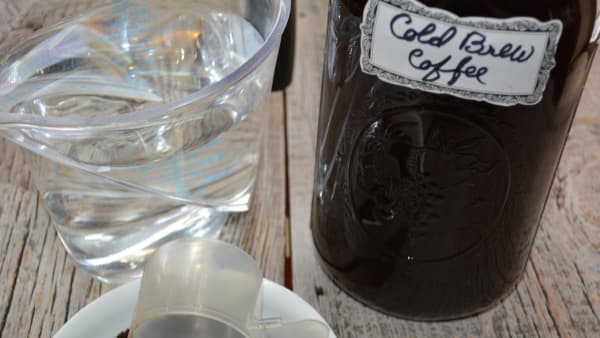Is Cold Brew Coffee Less Acidic?
If you feel that hot brew coffee gives you heartburn or indigestion, you may be looking for another option. You still want to drink coffee, but you need something that doesn’t make the burn worse.
Could cold brew coffee be the key to relief while still letting you enjoy your daily brew? Cold brew coffee enthusiasts love the smooth brew. And many claim that it is less acidic.
What do the facts say? Is cold brew coffee less acidic than hot brew?

Cold Brew Acidity pH
One of the major benefits that coffee enthusiasts attribute to cold brew coffee is lowered acidity.
There are different ways to look at acidity in coffee. One of those is the pH level of the beverage. That might sound scientific, involving complex acid chemistry (which can be complicated!).
But don’t fret. I’ll make it simple.
The pH level reflects how acidic a liquid is. The range goes from 0 to 14; the higher the number, the less acidic the liquid is. Low numbers on the pH scale mean the liquids are more acidic.
To give you an example, water has a very neutral pH of 7. A lemon comes in at around 2 on the pH scale. The pH level of any liquid can be measured, including coffee. Coffee clocks in around 5, and a less acid coffee has a more neutral, or higher, pH number.
Let’s take a minute and talk about where the acid in brewed coffee comes from. Just like fruits – and many other things we consume – coffee has natural acids.
When coffee is brewed, those acids are released. No matter the brewing method or temperature, those acids will be released into the brew.
But brewing temperature greatly affects acidity and antioxidant activity. Both cold brew coffees and hot brewed coffees have acidity. The point we’re interested in is how much acidity each one has, and how that acidity affects you.

Let’s look at hot brew coffee first. When regular coffee is brewed with hot water, the coffee extracts faster. Along the way, hot water extracts more acidity.
When coffee is brewed with cold water, slightly less acidity is released. Cold brew coffee acidity levels are a bit lower.
Popular folklore around coffee holds that cold brew has a much higher pH than hot brew coffee, and is therefore less acidic.
When you look at the numbers, cold brew coffee samples usually bounce around a pH level of between 4.85 to 5.13.
How does that compare with hot brewed coffee? Regular coffee brewed with hot water can have pH values from 4.85 to 5.10.
That hot brew level is a bit more acidic than cold brew coffees, but the difference is pretty minor. Whether or not that slight difference helps cold brew coffee to mitigate digestive problems such as acid reflux is hotly debated.
So the question remains, why does cold brew seem so much smoother than hot brew coffee?
Related Reads: Cold Brew Coffee Makers, Cold Brew VS Iced, Heating Cold Brew
Why Is Cold Brew Coffee Less Acidic?
Cold brew is often considered to be smoother and less acidic than its hot brew counterpart. To understand why, let’s take a deeper look at what is cold brew coffee.
The cold brew method is a brewing method where coffee grounds are steeped at room temperature for long periods of time, usually around 18 to 24 hours.
Although you might think that the long steep time of a cold brew coffee would release more acids, it doesn’t. The key is the water temperature.
As I mentioned, cold water or room temperature water extracts less acidity from coffee. That’s why cold brew coffee is known for being less acidic and why cold brew coffee is considered to be smoother than hot brew coffee.
For instance, Starbucks cold brew coffee is made with a cold brew coffee concentrate that has never been near hot water and has been steeped for 20 hours. Those factors make their cold brew seem smoother and less acidic than, say, a shot of espresso.
Something to note, though, is that the pH level of a beverage isn’t the only way – or the best way – to judge if a certain coffee is acidic. Although the pH level may show similar numbers with the two brewing methods, we might have to look elsewhere to figure out how coffee may affect our health.

How much less acidic is cold brew coffee?
If the variables of origin of the beans and ratio are maintained, how do the two types of brews, hot brew coffee, and cold brew coffee, compare? Is cold brew coffee less acidic, and if so, by how much?
We already mentioned that the pH level is one way to look at the acidity in coffee, and the levels don’t change much with cold brew coffee. But there’s another more comprehensive, though lesser-known, way to gauge the acidity of coffee.
Using a coffee sample, you can calculate the total titratable acidity (TA), or the total amount of acids in coffee. A brew can have different concentrations depending on various factors, such as the coffee-to-water ratio, but a key factor is the water temperature the coffee is brewed at.
Hot brew coffee extracts more titratable acidity than cold brew samples. That means that hot coffee has more extracted acids that cold brew coffee simply does not have.
That may be why you may feel better when you drink coffee made in the cold brew coffee method, even if the pH level is similar to hot brew coffee.
And though the role of acidity in coffee and how it may or may not affect acid reflux is a matter of debate, one thing is true. What works for you is more important than any studies done in a laboratory.
Keep in mind that these scientific studies and results don’t apply to iced coffee. Iced coffee is hot brew coffee that’s been prepared over ice or has ice added to it after brewing.
That’s why iced coffee is essentially hot coffee that’s been chilled. That’s why iced coffee doesn’t have the benefits of cold brew coffee because it doesn’t have a long steep time.

Who is Cold Brew Good For?
Cold brew simply tastes good. So, in essence, cold brew coffee is good for anyone. You can get a decaf cold brew if you completely want to avoid the caffeine as well as get lowered acidity.
But cold brewed coffee is ideal for coffee lovers with acid reflux or other gastrointestinal difficulties that seem to get worse when they drink hot brew coffee.
In addition to trying cold brewing methods, you can also reduce acidity with other choices. The roast, origin, and what you add to the cup also play a role in how coffee affects our health. Let’s take a quick look at those three variables.
Which roast should you choose, a dark roast or a light roast? How the coffee beans are roasted and for how long, affects the acidity levels. Dark roast coffee can have lower acidity when compared to light roasts.
That’s because the longer roasting time at a higher roasting temperature in darker roasts can lower acidity levels in the coffee bean. Many people who suffer from acid reflux feel that darker roasts ease the burn.
Also, you can choose a coffee bean from countries, or origins, that produce low-acid coffee. So when searching for a cold brew coffee, keep in mind that you can find less acidic coffee beans from countries like Mexico or Indonesia.
You can also lower the effects of acidity in cold brew coffee by what you add to the cup. Both milk and plant-based milks taste great in cold brew coffee, and they may act as a buffer against acidity.
One last point is that you might consider the quality of the coffee you’re drinking. High-quality coffee beans have usually been handled with more care than lower-quality coffee.
When you buy coffee beans from a conscientious coffee company, they’ve taken care during cultivation, processing, and roasting.
Drinking high-quality beans might help eliminate some of the negative effects of coffee.

Wrapping Up Cold Brewing & Acidity
Is cold brew coffee less acidic than hot brewed coffee?
The pieces of research linked in this article certainly suggest that cold brew coffee can have reduced acidity in comparison to hot brew coffee.
If you want to continue drinking coffee while avoiding gastrointestinal problems such as acid reflux, give cold brew coffee a try and see how it affects you.
The lowered acidity in cold brew coffee, measured both in the pH level of the coffee and the TA, or total titratable acidity, might be the difference you need to enjoy your beloved coffee drink once again.
Also keep an eye on the roast, since a darker roast might be better for you. Look into origins that produce low-acid coffee. And consider adding milk or plant-based milk to the final drink.
Happy cold brewing!

